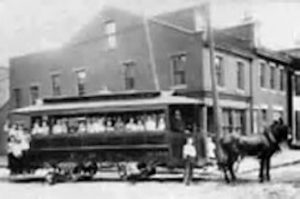
*On this date in 1863, a Black woman was forcibly removed from a horse-drawn streetcar in San Francisco and denied the right to ride the streetcar.
Charlotte L. Brown, the daughter of James E. and Charlotte Brown, was the victim. At 8 PM on April 17, 1863, Charlotte Brown sat on a horse-drawn streetcar one block from her home on Filbert Street in San Francisco. She was on her way to see her doctor. The Omnibus Railroad Company owned the streetcar. When the streetcar conductor approached her and asked her to leave, Brown said she "had a right to ride" and had no intention of leaving the car.
The conductor, Thomas Dennison, asked her several times to leave, and each time she refused. Finally, when a white woman objected to her presence, he grabbed her by the arm and escorted her off the car. Her father, James E. Brown, hired attorney W. C. Burnett, and Charlotte Brown brought a lawsuit against the Omnibus Railroad Company for $200.
Blacks had just won the right to testify against whites that same year. The Omnibus Railroad argued that its conductor's action was justified because racial segregation protected white women and children who might be fearful or 'repulsed' by riding in the same car as Blacks. In her courtroom testimony, she stated: "The conductor went around and collected tickets, and when he came to me, I handed him my ticket, and he refused to take it. It was one of the Omnibus railroad tickets, one that I had purchased of them previous to that time. He replied that colored persons were not allowed to ride. I told him I had been in the habit of riding ever since the cars had been running. I answered that I had a great way to go, and I was later than I ought to be." Brown won her case, presided over by Judge Cowles, but the jury only awarded her twenty-five dollars. The conductor, Dennison, was convicted in a criminal court of assault and battery against her.
Brown's civil case was on appeal for the next two years. In one retrial, the jury awarded Brown only five cents, the price of the streetcar ticket. Meanwhile, just three days after the first trial, Brown was ejected from another streetcar and brought a second suit against Omnibus for $3,000. Finally, in October 1864, her case was tried in a higher court. In his judgment of October 5, 1864, Judge Orville C. Pratt of the 12th District Court upheld the earlier verdict in favor of Brown, ruling that excluding passengers from streetcars because of their race was illegal.
He had no desire, he said in his ruling, to "perpetuate a relic of barbarism": "It has been already quite too long tolerated by the dominant race to see with indifference the negro or mulatto treated as a brute, insulted, wronged, enslaved, made to wear a yoke, to tremble before white men, to serve him as a tool, to hold property and life at his will, to surrender to him his intellect and conscience, and to seal his lips and belie his thought through dread of the white man's power," Judge Pratt stated.
In January 1865, a jury awarded Brown $500. The Omnibus Railroad Company appealed the verdict but was refused another trial. After the first trial, the Pacific Appeal noted that the verdict in her favor "establishes the right, by law, of colored persons to ride in such conveyances." "While the law recognizes and gives us the right to ride in such conveyances," the editorial continued, "there are a certain number of the employees of this Company, who, if a colored person attempts to cross the street while their car is passing, are seized with a sudden fit of Negrophobia, which is generally manifested by pulling their alarm bell violently, as if some danger was imminent, so afraid are they that some other of our respectable females might attempt to exercise the right that Miss Brown has just won.
So long as we have law, justice, and right on our side, we want no pity." The Charlotte Brown case paved the way for other cases brought by San Francisco Blacks like William Bowen and Mary Ellen Pleasant that challenged the "whites-only" practices of the privately owned streetcars. In 1893, the California legislature officially outlawed streetcar segregation on statewide streetcars. After Brown won her case, Senator Charles Sumner invoked the case in Congress as setting an important precedent for racial equality when he argued to integrate streetcars into the nation's capital.